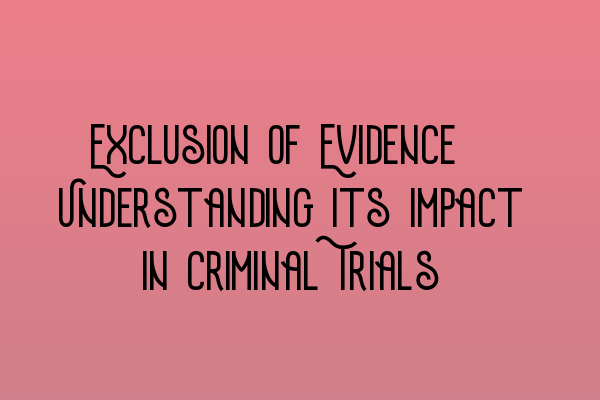Exclusion of Evidence: Understanding its Impact in Criminal Trials
Welcome to SQE Criminal Law & Practice Law UK! In this blog post, we will explore the concept of exclusion of evidence and its significant impact in criminal trials. Understanding how evidence can be excluded is crucial for legal professionals, and it is essential for aspiring lawyers preparing for the SQE Criminal Practice exam. Stay tuned as we dive into this topic in-depth.
What is Exclusion of Evidence?
Exclusion of evidence refers to the legal principle that certain types of evidence can be deemed inadmissible in court proceedings. This exclusion can occur for various reasons, such as violations of the defendant’s rights, improper collection methods, or instances where the probative value of the evidence is outweighed by its prejudicial effect.
When evidence is excluded, it means that it cannot be presented or considered by the judge or jury during the trial. This exclusion can have a significant impact on the outcome of a case, as certain crucial pieces of evidence may not be available for the trier of fact to consider.
The Impact of Excluded Evidence
The exclusion of evidence can have both positive and negative effects in criminal trials. Let’s explore these impacts in more detail:
Positive Impacts
One positive impact of excluding evidence is the protection of an individual’s rights. The exclusionary rule aims to ensure that evidence obtained through illegal or unconstitutional means does not enter the courtroom. By upholding this rule, the justice system maintains its integrity and protects defendants from unlawful investigations or searches.
Another beneficial aspect of evidence exclusion is the promotion of fairness. If evidence is obtained improperly or its reliability is questionable, its exclusion prevents the jury from being unduly influenced or swayed by unreliable or prejudicial information.
Furthermore, the exclusion of evidence can incentivize law enforcement agencies to adhere to proper investigatory procedures. Knowing that evidence obtained unlawfully will not be admissible in court encourages officers to follow the law and respect individuals’ constitutional rights.
Negative Impacts
While there are positive aspects to the exclusion of evidence, there are also potential negative impacts worth considering. One such impact is the potential for guilty individuals to go free due to the unavailability of key evidence. In some cases, excluding evidence may hinder the prosecution’s ability to establish guilt beyond a reasonable doubt, resulting in an unjust outcome.
Additionally, excluding evidence can undermine public confidence in the criminal justice system. If the exclusion of evidence appears to protect individuals who may be guilty of committing crimes, it may create a perception of a flawed system that favors the accused over justice.
Conclusion
Understanding the impact of the exclusion of evidence is crucial in criminal trials. It upholds the integrity of the justice system while ensuring fairness for all parties involved. As a legal professional or an aspiring SQE Criminal Practice exam candidate, familiarizing yourself with the rules and principles surrounding this topic is essential.
For further resources on criminal practice and enhancing your legal expertise, check out our related articles:
- Workshops and Seminars on Criminal Practice: Expanding Your Expertise
- Updates in UK Criminal Laws: Staying Informed and Prepared
- Mock Tests for SQE Criminal Practice: Exam Simulation for Success
- Enhancing Your SQE Criminal Law Study Group Experience
- Decoding Criminal Evidence Rules: A Detailed Analysis
Remember, staying informed and prepared is key to success in the field of criminal law. For more valuable insights and expertise, feel free to explore our website and browse through our available resources.
